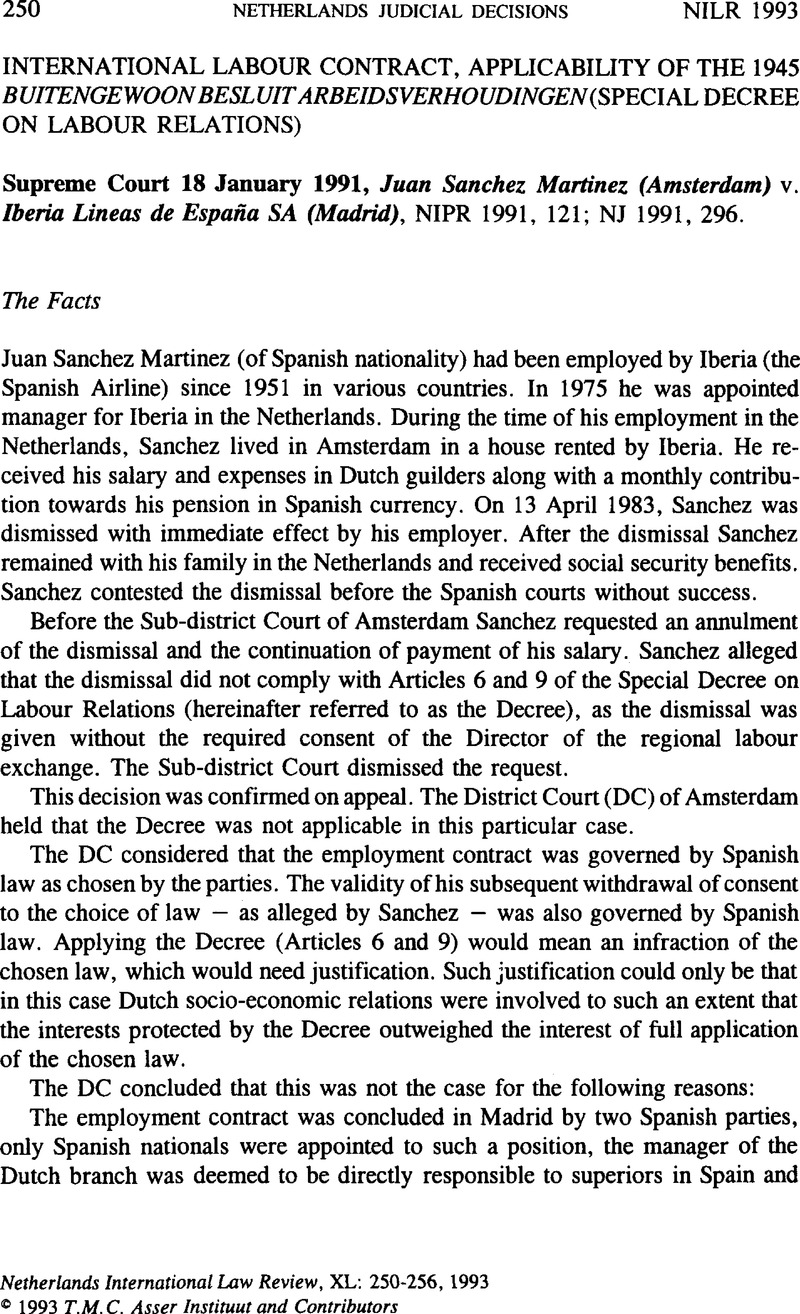No CrossRef data available.
Published online by Cambridge University Press: 21 May 2009

1. HR 5 June 1953, NJ 1953, 613, Melchers; HR 8 January 1971, NJ 1971, 129, American Express v. Mackay; HR 7 September 1984, NJ 1985, 104, Kampman; and recently HR 23 October 1987, NJ 1988, 842, Sorensen v. Aramco Overseas Co. (see NILR (1990)79–82, note M.V. Polak).
2. van Rooy, R. and Polak, M.V., Private International Law in the Netherlands (1988) p. 124 et seq.Google Scholar
3. C.J.J. vanMaanen, ‘HetBBAenhetinternationaalprivaatrecht’.WPNRnos. 5584and5585.
4. Art. 6 EC Contracts Convention, Individual employment contracts:
(1) Notwithstanding the provisions of Article 3, in a contract of employment a choice of law made by the parties shall not have the result of depriving the employee of the protection afforded to him by the mandatory rules of the law which would be applicable under paragraph 2 in the absence of choice.
(2) Notwithstanding the provisions of Article 4, a contract of employment shall, in the absence of choice in accordance with Article 3, be governed:
(a) by the law of the country in which the employee habitually carries out his work in performance of the contract, even if he is temporarily employed in another country; or
(b) if the employee does not habitually carry out his work in any one country, by the law of the country in which the place of business through which he was engaged is situated; unless it appears from the circumstances as a whole that the contract is more closely connected with another country, in which case the contract shall be governed by the law of that country.
Art. 7, Mandatory rules:
(1) When applying under this Convention the law of a country, effect may be given to the mandatory rules of the law of another country with which the situation has a close connection, if and in so far as, under the law of the latter country, those rules must beapplied whatever the law applicable to the contract. In considering whether to give effect to these mandatory rules, regard shall be had to their nature and purpose and to the consequences of their application or non application.
(2) Nothing in this Convention shall restrict the application of the rules of the law of the forum in a situation where they are mandatory irrespective of the law otherwise applicable to the contract.
5. HR 8 June 1973, NJ 1973, 400.
6. Report on the Rome Convention by Giuliano and Lagarde (1980) OJ C 282/25.
7. And is accepted in French case-law; see Foyer, J., ‘Entreé en vigueur de la Convention de Rome du 19 juin 1980 …’, 118 Journal du Droit International (1991) no. 2 para. 34.Google Scholar
8. See: de Boer, Th. M., ‘The EEC Contracts Convention and the Dutch Courts’, RabelsZ (1990) pp. 44–45Google Scholar; Reithmann, and Martiny, , Internationales Vertragsrecht (1988) pp. 710–713Google Scholar; Morse, C.G.J., ‘Consumer Contracts, Employment Contracts and the Rome Convention, ICLQ (1992) pp. 15–16.Google Scholar
9. The European Court of Justice has not yet been given interpretative authority.
10. Report on the Rome Convention by Giuliano and Lagarde (1980) OJ C 282/25.
11. The reservation of Art. 22 para. l(a) EC Convention has been made by Germany, Luxembourg and the UK.
12. Vlas, P., “Veranderingen in het i.p.r. overeenkomstenrecht: geen revolutie maar “EVOlutie”’, TVVS (1991) no. 91/9, p. 229.Google Scholar
13. van Toelichting, Memorie, Tweede Kamer 1988–1989, 21 059 (R 1365), no. 3 p. 15.Google Scholar
14. See Strikwerda, L., InleidinglnternationaalPrivaatrecht (1992) p. 186.Google Scholar Also on this subject Rammeloo, S., Das neue EG-Vertragskollisionsrecht, para. 9.4.5. p. 410 et seq.Google Scholar
15. CA Amsterdam 16 June 1988, NIPR 1988 no. 537 and EC Contracts Convention 1980, Art. 4 para. 3, and Art. 8 para. 1.